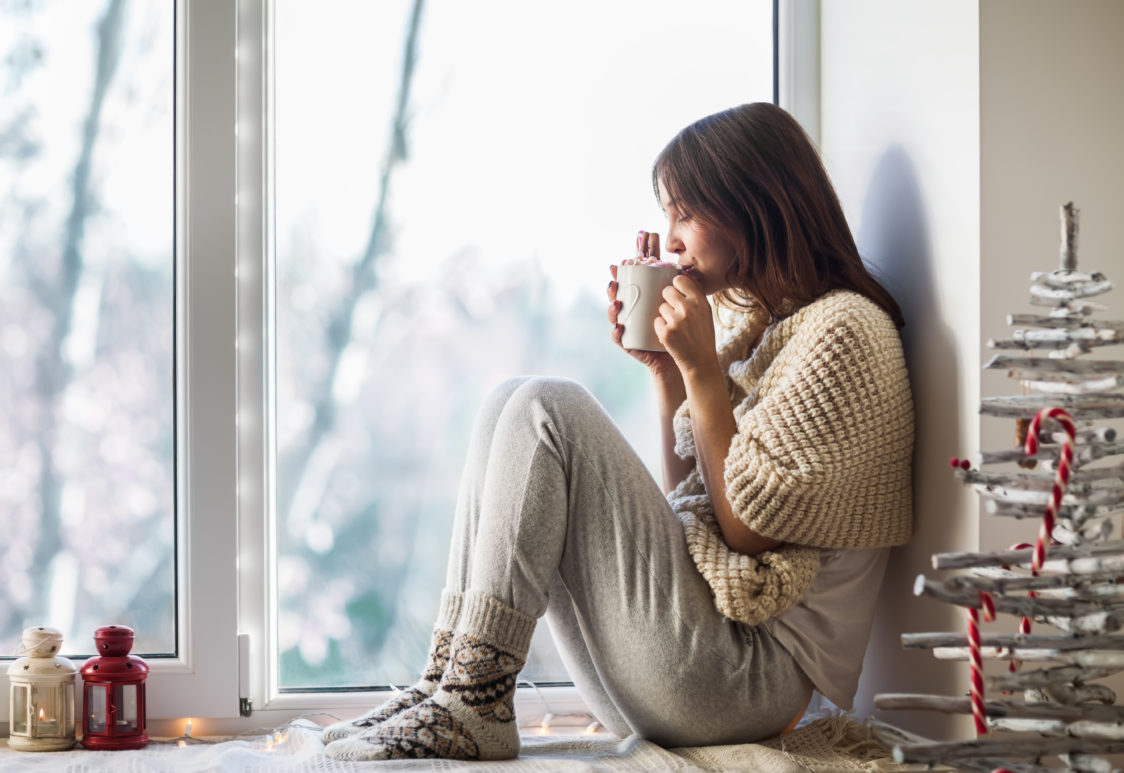Table of Contents
The festive season is one of the most wonderful times of the year for many people. But it is also one of the most challenging. Everything revolves around the preparations for several festive days. At home, you do a general clean, prepare decorations, bake cookies, buy gifts, and on top of that you want to catch up on parties and get together for a mulled wine with all your friends. In addition, students are starting exams, working people are going full speed to catch up with everything they’ve been putting off all year, and now there’s simply no room to shift the deadline.
This leaves you with woefully little time for yourself and your interests. When the last drop, or rather snowflake, of worrying about your post-Christmas body is added to all of this, it can trigger a serious avalanche of stress. Fortunately, you can prevent it with some simple tips from today’s article.
How can stress manifest itself?
When the weight of our responsibilities falls on you like a big boulder, the symptoms of stress start to set in. It can spoil the serenity of the Christmas season and disrupt your everyday life. You can feel its effects both mentally and physically.
Symptoms of stress include:
- an increase in heart rate and blood pressure
- increase in breathing
- sweating
- goosebumps
- dilation of the pupils
- sleep disorders
- changes in appetite
- digestive disorders
- fatigue
- feelings of anxiety and irritability
- restlessness and disturbances in concentration
- headache [1–2]
If you want to learn more about stress and its effects on the body, read our article Why Is Stress Dangerous for Us and How to Reduce It?

Ten tips for a calmer Christmas
To avoid unpleasant symptoms, it is advisable to prevent stress. The following practical tips can help you do this. Thanks to them, you can finally enjoy the run-up to Christmas and the holidays without any additional stress.
1. Share the responsibilities
If you’ve already switched into Christmas elf mode with your first Christmas decorations, wanting to please everyone and prepare the perfect Christmas, it’s probably time to cut back a little. You don’t have to bake no less than ten different kinds of cookies, make a homemade eggnog for everyone you know, decorate every inch of your house, and then redo everything a few more times because it wasn’t perfect.
It is better to realistically plan what you really want to do and what you have the time and energy to do. Bake just a few of your favourite types of cookies and maybe you can buy the rest. Or arrange with your mum or a friend to bake a larger quantity of one kind and share. Don’t be afraid to ask your loved ones for help if you can’t pick up the Christmas tree or anything else. You’re not on your own, and there’s bound to be someone who’s happy to help.
Accept that something can and will go wrong. The cookies won’t turn out right, the dinner will burn, the cat will tear down the decorated tree or your partner won’t be as excited about your gift as you expected. That’s just life. Therefore, rather than worrying unnecessarily about a spoilt Christmas, laugh together at any setbacks and continue to enjoy the moments with your loved ones. That’s what Christmas is ultimately all about.
If you want to discover some more tips to help you lead a calmer life, read our article 8 Tips to Slow Down and Enjoy Life More.

2. Arrange a schedule with your family
If you’re a little nervous about what you’re going to do for the holidays, make a plan. Try to work out a basic schedule with your family. However, you don’t have to participate in every activity and spend minute by minute together. Feel free to go for a workout instead of a walk, or skip watching a movie together if you’d rather read. You don’t have to go around visiting out of obligation and greeting everyone in person either. I’m sure they already have enough visitors too, and all you have to do is text or call during the holidays. You can meet any time during the year when it’s quieter. [3]
3. Find a little time for yourself
If you’re always running around, shopping, preparing things, cooking or cleaning and forgetting about your own needs, this beautiful festive season can turn into a nightmare. During Advent, think of ideally having a moment for yourself every day. This is key to maintaining your mental well-being.
Plus, you definitely deserve a little pampering. Treat yourself to a hot bath, a massage, a sauna, a wellness session or your favourite movie. You don’t have to spend time alone. Take a friend for coffee and catch up together. You’ll find that a problem shared is a problem halved. Then you’ll certainly feel a little more relaxed and content.
You might be interested in these products:
4. Focus on the moment
Try not to keep thinking about who you need to visit and what you still have to prepare for tomorrow. There’s also no point worrying about whether relatives who don’t like each other will fight with each other at the family reunion. Try not to think so much about what will happen when Christmas is over and how you will start the new year. All that drains the magic of the moment that won’t ever be repeated. That way, the festive spirit won’t so much as cross the threshold of your house and as a result, no one is happy. [4]
It’s also a good idea to take a break from social networking. For example, if you feel like you’re not keeping up with anything, it probably won’t do you any good to see all the perfect Christmas trees and the influencers’. Same as the perfectly dressed families photographed under the Christmas tree looking like a good luck charm. You might be surprised at how many tears and effort sometimes went into that picture. Simply, not all that glitters is gold.
In addition, if you want to discover what can help you limit your social networking, there are practical tips available in our article How Does Endless Scrolling on Social Media Affect You?

5. Have your finances under control
Christmas can make a sizeable dent in any wallet and blow your money all over the place. Not to mention the fact that many people take out loans for the holidays to buy expensive gifts and other often unnecessary items. The worry of not having enough money can be a real contributor to stress. If you don’t want to have to file for bankruptcy after the holidays, you’d better set a budget that’s the maximum you can spend during the festive season.
Only buy gifts that you can really afford and don’t spend on unnecessary items. Arrange with your loved ones that you could give yourself fewer gifts this year, they will probably welcome this too. Feel free to set a maximum amount for yourselves. A great option is also to agree with your family on a predetermined number of self-made gifts, which will delight them the most anyway.
You can also save on decorations. Maybe this year you can forgo buying new Christmas decorations according to the latest trends and decorate your tree with what you already have at home. Or hang decorated gingerbread and dried fruit on it. As well as an authentic tree, you’ll also have a delicious treat on hand.

6. Give meditation or cold exposure therapy a chance
As part of your self-care, it is a good idea to include morning activities to help you cope a little better with this challenging period. For some, this might be yoga, writing a gratitude letter, a short mindfulness meditation or a cold shower. Choose what works for you and take a few minutes each morning to do this activity. Have faith that such a simple action can improve your mood, get your day off to a good start and get you through the day with a greater peace of mind. [3]
You can also rely on these tools during the day. If you start to panic because you feel like you can’t keep up and everything is falling apart, do a short breathing exercise. Close your eyes for a moment and focus on your breathing. Take a few deep breaths in and out and then open your eyes and you’ll see that you feel a little calmer. At times like this, it’s handy to have a mindfulness app on your phone, such as headspace or calm. You can switch on a five-minute guided meditation at any time.
For more advice on how to cope with difficult times a little more easily, see our article 12 Tips on How to Take a Positive Approach to Life in Difficult Situations.
7. Try to get adequate sleep
Quality sleep is the alpha and omega of a healthy body and mind. During the Christmas holidays, when an avalanche of tasks, catching up with responsibilities and Christmas parties is upon you, an eight-hour sleep is unfortunately somewhat of a rarity. If you don’t get the right amount of sleep, you’ll be tired during the day, less productive and more likely to not get everything done that you need to, which can ultimately make you even more stressed. Studies also show a link between poor sleep quality and higher levels of stress. That said, try to do everything you can to get between seven and nine hours of sleep a day. [5]
To help you discover what can help you get a good night’s sleep, take a look at our article How to Fall Asleep Quickly? Try These Simple Tips for a Better Sleep.

8. Try and be physically active every day
When you exercise, endorphins and other substances that can induce pleasant feelings are released to a greater extent. That is why it is even more important during this time than at any other. You might be thinking that you don’t have time to go to the gym every day during the festive season. While lifting heavy weights is a great sport, it’s not the only one you should do. A walk, a stretch, a short run or HIIT will suffice.
The main point is that your only physical activity shouldn’t be running around shopping centres or getting off the couch to get some sweets. You should also not worry about missing out on your regular workout schedule. It’s just a few days thus it won’t ruin your progress. After the holidays, you’ll get back on track and everything will kind of naturally fall back into place. [6]
What else can exercise bring to your life? You can find out everything you need to know by reading our article Why Should You Exercise? Stronger Immunity, Heart Health and 8 Other Reasons.
9. Treat yourself, but maintain healthy diet
If you’re anxious about putting on five kilos of fat after a few sugary treats or having the holidays ruin your year-long work, we’ve got good news. First and foremost, you’ll probably be pleased to know that it’s virtually impossible to gain that much fat in just a few days. And if you do gain a few extra kilos after the holidays, it will soon level out once you return to your normal routine.
On the other hand, it doesn’t mean you can break free from the chains and eat everything you come across. This can lead to indigestion and regret. Feel free to indulge in sweets and other Christmas treats, but they shouldn’t be served as dessert after breakfast, lunch and dinner.
Maintain the basic rules of a healthy diet during the festive season:
- Pay attention to regularity. Whether you normally eat three or six times a day, try to maintain a similar pattern.
- Watch the nutritional composition of your meals. Each main meal should contain complex carbohydrates, protein, fat and fibre. That way, your body gets everything it needs and you can better control your intake of sweets and other Christmas goodies. To learn more about how to create a healthy meal, check out our article, What is a Healthy Diet and How to Learn to Eat Healthily?
- Don’t forget fruit and vegetables. Try to eat at least 400 g of these superfoods every day.
- Other healthy foods should also be kept in your diet. These include whole grains, legumes, low-fat dairy products, fish and lean meat. [9]
For more tips on how to keep fit and keep well over the Christmas season, check out our article 10 Tips on How to Enjoy Christmas and Stay Fit.

10. Don’t deal with stress by overeating or alcohol
A bar of chocolate or a bottle of wine may seem like quick-fix tools to solve all of your problems. Although sweet food and alcohol can evoke pleasant feelings and the short-term impression that all is well, however after finishing the last square of chocolate or sobering up, a bitter clash with reality awaits. You may even feel worse than when you started. These inappropriate practices can make your mental health even worse. Therefore, in times of stress, it is better to rely only on the tips mentioned above, which are more effective, healthier and can bring long-term help instead of quick relief. [7-8]
If you are wondering what effect alcohol has on the body and what can help with a hangover, read our article Hangover: Why Does It Occur and How to Get Rid of It Quickly?
What should you remember?
If Christmas is synonymous with endless shopping, preparation and stress, it’s time to change that. Finally start enjoying some festive peace and quiet with our tips in today’s article. Try not to put so many tasks on yourself at this time, work out a nice plan with your family and find some time for yourself. Keep your finances under control and don’t forget a balanced diet, regular exercise and other tools to help you manage stress better. Have a wonderful and enjoyable Christmas with your loved ones!
Do you have someone in your circle of friends who stresses unnecessarily every year before the holidays? Share this article and help them spend their Christmas in a calmer mindset this year.
[1] Nhs.Uk. Get help with stress. – https://www.nhs.uk/mental-health/feelings-symptoms-behaviours/feelings-and-symptoms/stress/
[2] Struggling with stress? https://www.nhsinform.scot/healthy-living/mental-wellbeing/stress/struggling-with-stress]
[3] Psychology Today. How to Handle Holiday Stress – https://www.psychologytoday.com/intl/blog/the-big-reframe/202212/how-handle-holiday-stress
[4] Newport Institute. 7 Strategies for Holiday Stress Management. – https://www.newportinstitute.com/resources/mental-health/holiday-stress-management/
[5] Alotaibi, A. D., Alosaimi, F. M., Alajlan, A. A., & Bin Abdulrahman, K. A. The relationship between sleep quality, stress, and academic performance among medical students. – https://doi.org/10.4103/jfcm.JFCM_132_19
[6] Sharma, A., Madaan, V., & Petty, F. D. (2006). Exercise for Mental Health. Primary Care Companion to The Journal of Clinical Psychiatry, 8(2), 106.
[7] Stress and eating. – https://www.apa.org/news/press/releases/stress/2013/eating
[8] Drinkaware. Alcohol and Stress: Drinking Due To Stress. – https://www.drinkaware.co.uk/facts/health-effects-of-alcohol/mental-health/alcohol-and-stress
[9] WHO. Healthy diet. – http://www.who.int/nutrition/publications/nutrientrequirements/healthydiet_factsheet/en/

